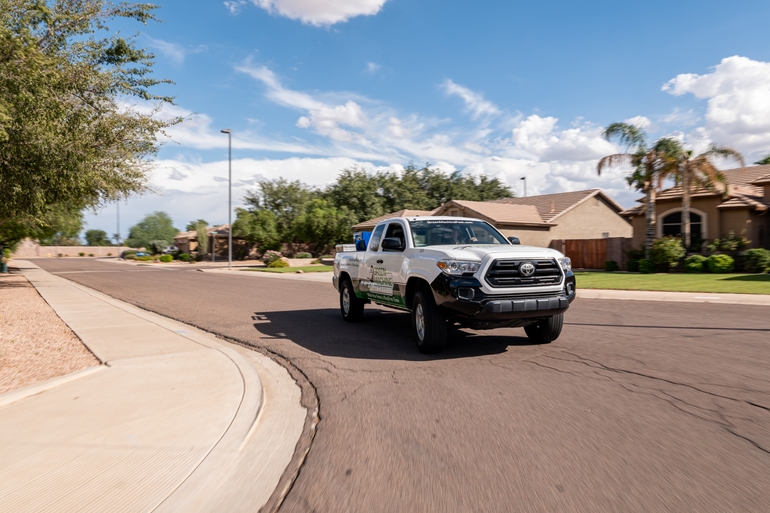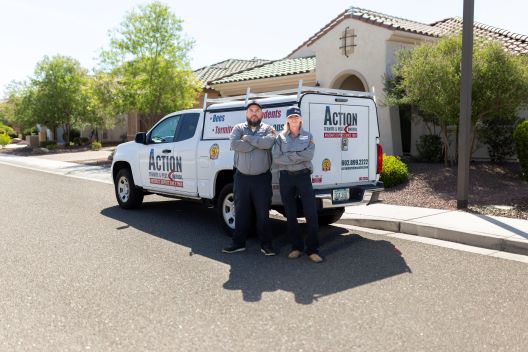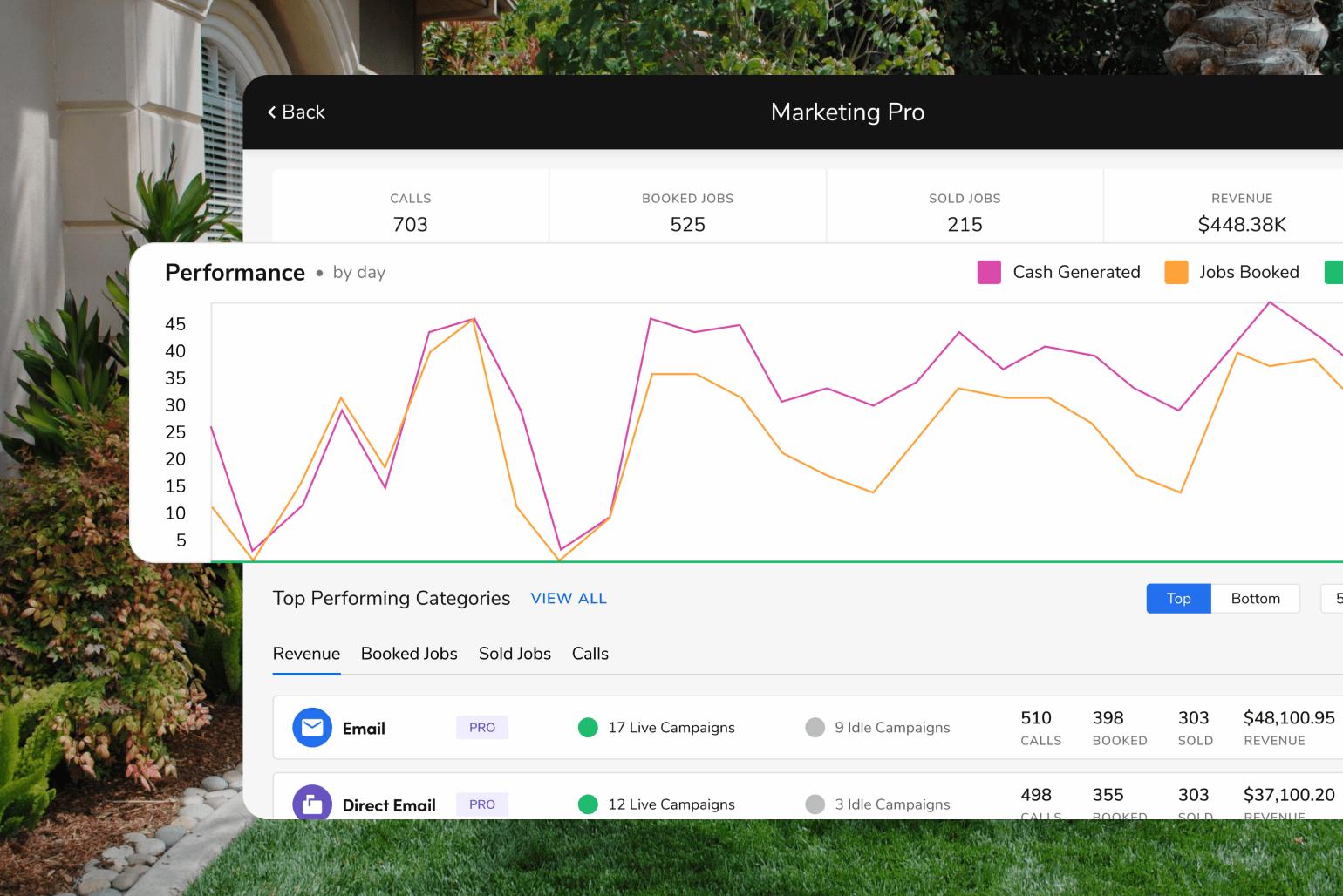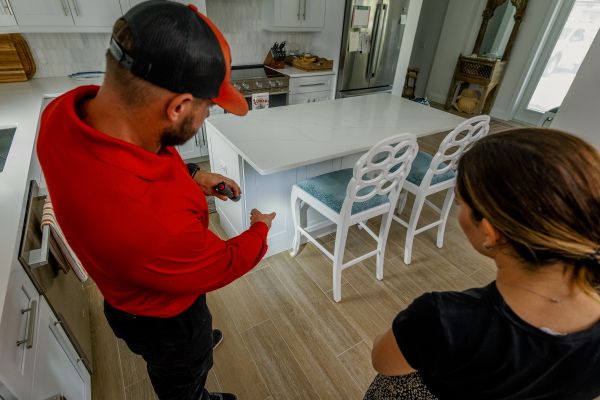California Pest Control License & Certification (Updated as of 2024)

Getting a pest control license gives you financial stability by joining a growing industry requiring skilled workers. Certified pest control professionals are in high demand across the US, especially in states with significant agricultural sectors like California.
The Bureau of Labor Statistics projects a 3% growth in pest control workers from 2023 to 2032. In California, the average salary for a pest control applicator is approximately $38,833, with a potential for higher earnings.
What Is a Pest Control License?
A pest control license allows individuals to manage pest control solutions using fumigants and pesticides on residential, agricultural, and commercial properties.
License holders can eradicate wood-destroying pests like termites, and,
preserve wood, lawns, and ornamental plants.
The pest control license requirement varies by state.
Do You Need a Pest Control License in California?
Yes, you need a license to apply pesticides in California. These licenses are issued by the California Department of Pesticide Regulation (DPR). The DPR oversees all non-agricultural pest control activities in the state, including the use of restricted-use pesticides (RUPs) in various locations.
Residential and Commercial Structures: Includes homes, apartments, and businesses.
Agricultural Lands: Fields, orchards, and other agricultural sites.
Public Health Areas: Includes areas like parks and schools.
The right license ensures you comply with state regulations and can legally perform pest control work.
What Are the Licensing Requirements for Pest Control Contractors in California?
The Licensing and Certification Program is part of the training and certification process for pesticide applicators, pest control advisers, and entities that sell or apply pesticides.
The license categories include:
Individual Licenses and Certifications: For individuals applying pesticides or supervising their application.
Business Licenses: For companies offering pest control services.
What Are the Different Types of Pest Control Licenses in California?
California offers several types of pest control licenses to cater to various needs within the pest control industry.
License Category | Description |
Qualified Applicator License (QAL) | A Qualified Applicator is a licensee approved by the Department of Pesticide Regulation to apply select pesticides in agricultural and green industries safely. |
Qualified Applicator Certificate (QAC) | For applicators that apply or supervise the application of federally restricted use pesticides or state restricted materials for any purpose or on any property other than that provided by the definition of a private applicator. |
Agricultural Pest Control Adviser License | An Agricultural Pest Control Adviser (PCA) is any person who offers a recommendation on any agricultural use, holds himself/herself as an authority on any agricultural use, or solicits services or sales for any agricultural use |
Pest Control Dealer License | For businesses that sell pesticides. |
Pest Control Aircraft Pilot Certificate | For pilots who apply pesticides by aircraft. |
Structural Pest Control License | For individuals and businesses that perform pest control on structures such as homes and commercial buildings. |
These licenses ensure individuals and businesses are qualified to perform pest control work safely and correctly.
For more detailed information on each license type, visit the California Department of Pesticide Regulation's Licensing and Certification Program, part of the ca.gov. website.
What Are the Steps to Get a Pest Control License in California?
Getting a pest control license in California involves several steps. Follow the California DPR’s guidelines for either the certified or qualified applicator licensing process:
Determine the Type of License You Need: Based on your role and the type of pest control work you will perform, decide if you need a Certified Applicator License or a Qualified Applicator License.
Complete the Required Training: Study materials are available through the California DPR. Training covers the safe use of pesticides, pest management, and state regulations.
Pass the Licensing Exam: Submit an application and the appropriate fee. Schedule and take the category-specific exam. There is a $45 convenience fee for taking the exam at a convenient location, such as home or the office. Achieve a passing score on the exam.
Submit Your Application: Fill out and submit the application along with proof of training and exam results. Include the application fee and any additional required documents.
Maintain Continuing Education: Once licensed, complete continuing education on pest management practices and regulations. Attend workshops, seminars, or online courses to meet continuing education requirements.
Adhere to State Regulations: Comply with all state regulations on pesticide use and pest control work. Keep records of pesticide applications and follow safety protocols.
What Is the Mean Salary for a Pest Control Technician in California?
Here are the average salaries for different positions in the pest control industry in California:
Pest Control Technician: Approximately$55,777 per year.
Certified Applicator: Around $37,605 per year.
Qualified Applicator: Around $44,160 per year.
Pest Control Supervisor: About 42,394 per year.
Salary will vary depending on the city you work in and other factors like education, certifications, additional skills, and years of experience.
How Much Does It Cost to Get a Pest Control License?
In California, the cost of obtaining a pest control license varies depending on the license type. The application fee for a Certified Applicator License is $40.
The test comes with a $55 examination fee for the core portion, with an additional $50 for each category test you wish to take (to a maximum of three categories in one sitting).
Continuing education is also required to keep your license; the cost varies depending on the courses you take and how you renew it.
How Long Does It Take to Get a Pest Control License?
The timeframe to get a pest control license in California varies depending on the license type, experience, and training. You have 12 months from the first date you scheduled your examination to pass the examination. You must begin your 40-100 hours of work experience during this time.
The earliest you can get the licenses is likely to be two months. For a more detailed timeline, check with the California Department of Pesticide Regulation (DPR) to ensure you meet all the requirements.
California Pest Control Training Programs and Schools
Since pest control technology and methods are becoming more complex, formal training is very beneficial and often required. Many programs and schools in California offer the training to become certified pest control professionals. These programs are located throughout the state and include in-person and online options.
Certificate Programs and Degrees:
California Community Colleges: The programs prepare students to be licensed professional production consultants serving agriculture and producers. If you want to earn your degree in Agricultural Pest Control Adviser and Operator (Licensed), apply to one of the participating community colleges.
Registered Apprenticeship Programs:
The Green Shield Certified and the University of California Statewide IPM Program (UC IPM) invites pest management professionals to apply for two-year structural and landscape pest management apprenticeships.
Accreditation and Approved Programs:
National Organizations: Programs may be accredited by national organizations, such as the National Pest Management Association (NPMA), which ensures they meet industry standards.
Program Prerequisites:
Eighteen years old and high school diploma or GED.
Many programs require a drug test and physical exam.
Reliable transportation for fieldwork.
On-the-Job Experience:
On-the-job experience is key to developing the hands-on skills needed to be a pest control professional. You must have good customer service skills, be detail-oriented, have some mechanical capability, and be physically fit because the job can include some heavy lifting and hours of walking, standing, and working in tight spaces.
Completing one of these programs will give you the knowledge and skills to pass the California licensing exam and start a pest control career.
California Licensing Exam Details
To become a certified pest control applicator in California, you must pass the licensing exam administered by the California Department of Pesticide Regulation (DPR). The state has contracted with PSI Testing Services to administer the exams.
Exam Requirements:
Qualified Applicator License Exam:
Exam Fee: $55
Pass Grade: 70%
Exam Content: The exams cover topics necessary for safe and effective pest control, including:
General Pest Control Practices: Pest biology, control methods, integrated pest management.
Pesticide Use and Safety: Pesticide use, RUPs, and safety protocols.
State Regulations: California state laws and regulations for pest control operations.
Exam Format:
Multiple Choice: The exam is multiple choice.
Open Book: The exam is open, and you can use approved reference materials during the test.
Time Limit: You will have enough time to complete the exam and review all the material.
Study Materials: The DPR has study materials and resources that cover all the exam topics.
Locations: Exams are administered at PSI testing centers throughout California. You can schedule a time at a location near you.
For more information and to schedule your exam, visit the PSI Exams website or contact PSI directly: 3210 E Tropicana, Las Vegas, NV 89121, phone: 855-746-8173.
All questions and inquiries about licensure should be directed to the California Department of Pesticide Regulation:1001 I Street, Sacramento, CA 95814, Phone: 916-445-4300.
Does My California Pest Control License Work in Any Other State?
No. Although California has a reciprocity path for licensing, there is only one formal agreement with Washington state, but no others.
If you are coming from another state to California or wish to work outside of California, excluding Washington, you must apply for a pest control license in the state where you will work.
You can view other states here.
Pesticide Applicator Specific Requirements: EPA Certification
Federal EPA regulations under the Federal Insecticide, Fungicide, and Rodenticide Act (FIFRA) mandate certification for pesticide applicators who use restricted-use pesticides (RUPs).
This requirement applies to those applying RUPs in specific areas, such as Indian country, and includes various types of applicators, such as not-for-hire, government, and education applicators.
Certification Exam: You must get your EPA Certification from an approved organization. The EPA’s website lists approved organizations.
Types of EPA Certifications: There are different levels of certification depending on the scope of work:
Private Applicator: For individuals using RUPs to produce agricultural commodities on their own or rented land.
Commercial Applicator: For individuals applying RUPs in residential, commercial, or industrial areas.
Non-Commercial Applicator: For those applying pesticides as part of their job on properties owned or managed by their employer.
Core Exam: For all certifications, you must pass the core section of the EPA certification exam, which covers:
Pesticide Laws and Regulations
Pest Identification and Biology
Pesticide Formulations
Application Techniques
Safety Protocols
Environmental Protection
Specific Exam Requirements: Depending on your role, you may need additional certification in specific areas:
Agricultural Pest Control
Ornamental and Turf Pest Control
Structural Pest Control
Public Health Pest Control
Training and Preparation: Most training programs include preparation for the EPA certification exam as part of their curriculum. You can also find approved training programs on the EPA’s website or through state agencies like the California Department of Pesticide Regulation (DPR).
Visit the EPA’s Certification of Pesticide Applicators (CPA) page for more information and to view approved certification plans.
What Happens If My Pesticide License Expires?
If your pest control applicator license expires, you must stop all work immediately. Applying pesticides and other restricted-use chemicals without proper certification in California is illegal and can result in severe penalties.
To avoid penalties, you’ll want to get a pest control license before performing any work. Those working without a license will be found guilty of a misdemeanor, face a fine of up to $5,000, and potentially six months of jail time.
Other Requirements Unique to California
To keep your pest control license in California, you need to be aware of the following state-specific requirements:
License Renewal: California requires you to renew your pest control license yearly. The renewal process includes submitting a renewal application and paying the renewal fee, which varies by license type.
Insurance: Pest control businesses in California must carry liability insurance to cover damages from pesticide applications. DPR requires proof of insurance as part of the licensing process.
Compliance with Local Regulations: In addition to state requirements, you must comply with local ordinances or regulations for pest control operations. This may include additional permits or application restrictions. Government applicators may apply restricted-use pesticides on property owned or controlled at a federal, state, county, or local level.
Worker Safety Training: Employers must train and motivate all employees who handle pesticides on safety protocols and emergency procedures. This includes training on the proper use of personal protective equipment (PPE) and first aid in case of exposure. Obtaining pesticide certification is crucial to ensure compliance with safety standards.
Continuing Education
Continuing Education is required to keep a pest control license in California. Licensed pest control applicators in California must complete continuing education units (CEUs) annually to keep their license active and stay current with industry practices and regulations.
Requirements:
Annual CEUs: The California Department of Pesticide Regulation (DPR) determines the number of CEUs applicants must complete each year.
Approved Courses: CEUs must be earned through DPR-approved courses, workshops, seminars, online training, and other programs related to pest management and safety.
Failing to complete the required continuing education can prevent you from renewing your license and may result in the suspension or revocation of your certification.
Resources
You can stay current on all pest control industry news and requirements by visiting the following:
Using these resources helps you stay current on industry trends, regulatory updates, and professional development opportunities so your pest control operation remains compliant and competitive.
Ready to Get Certified?
Obtaining your pest control license in California is a smart move toward a stable career in a growing industry. With proper preparation and resources, you can become a certified applicator and launch your career in this field.
Take the next step: Visit our FieldRoutes Blog to learn more about commercial pest control and discover how FieldRoutes can help streamline your operations.





